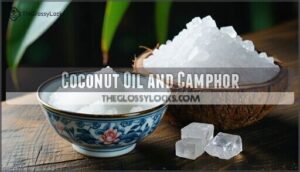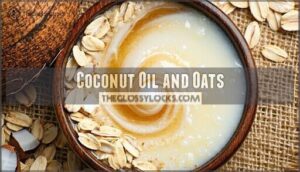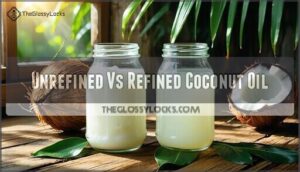This site is supported by our readers. We may earn a commission, at no cost to you, if you purchase through links.

Its moisturizing properties can improve your skin’s texture, making it softer and more even-toned.
While coconut oil alone won’t drastically lighten your complexion, pairing it with ingredients like lemon or turmeric may enhance its brightening effects.
The oil’s antioxidants and antimicrobial qualities also help protect your skin from damage, which can reduce dark spots and uneven patches over time.
Remember, results aren’t overnight—it’s a gentle process, not a magic wand.
Curious about DIY recipes that bring this to life? Let’s explore them!
Table Of Contents
- Key Takeaways
- Coconut Oil Benefits
- Using Coconut Oil
- DIY Coconut Oil Recipes
- Skin Whitening Effects
- Choosing Coconut Oil
- Frequently Asked Questions (FAQs)
- How to use coconut oil for whitening skin?
- How long does coconut oil take to lighten skin?
- Does coconut oil make skin glow?
- Is it OK to use coconut oil on your face everyday?
- Does coconut oil lighten skin?
- Which oil is the best for skin whitening?
- How to use coconut oil for skin pigmentation?
- What happens if we apply coconut oil on our face overnight?
- Does coconut oil reduce melanin?
- Is coconut oil good for whitening your skin?
- Conclusion
Key Takeaways
- Coconut oil hydrates deeply, reducing dryness and inflammation while improving your skin’s texture and tone over time.
- It can gradually brighten your skin by fading dark spots and uneven areas but won’t lighten your complexion drastically.
- Pairing coconut oil with natural ingredients like lemon or turmeric can boost its brightening effects.
- Always do a patch test first and apply sparingly, especially if you have acne-prone or sensitive skin, to avoid irritation or clogged pores.
Coconut Oil Benefits
You’ll find that coconut oil’s rich composition of fatty acids and antioxidants makes it an effective moisturizer that can improve your skin’s overall appearance and tone.
Coconut oil’s fatty acids and antioxidants deeply hydrate, enhancing your skin’s natural radiance and creating a smoother, healthier appearance.
While it won’t dramatically lighten your skin like chemical bleaching agents, its anti-inflammatory properties and ability to promote cell renewal can help reduce dark spots and create a more even, radiant complexion over time, with fatty acids contributing to its effectiveness.
Moisturizing Properties
Coconut oil’s moisturizing prowess stems from its unique fatty acid composition.
These medium-chain fatty acids enable deep penetration into your skin layers, delivering exceptional hydration levels that tackle stubborn dryness relief head-on.
- Strengthens skin barrier – Creates protective layer preventing moisture loss
- Boosts hydration levels – Locks in water for lasting skin moisturization
- Enables deep penetration – Reaches lower skin layers effectively
- Provides dryness relief – Soothes parched, flaky skin naturally
Anti-Inflammatory Effects
Beyond hydration, you’ll find coconut oil’s anti-inflammatory properties work like a gentle firefighter for your skin.
Coconut oil’s anti-inflammatory benefits calm skin like a gentle firefighter, reducing redness and soothing irritation naturally.
This natural remedy tackles skin inflammation head-on, offering redness reduction and irritation calming benefits.
Whether you’re dealing with eczema relief or acne soothing needs, coconut oil supports barrier repair while promoting the even-toned complexion you’re after through consistent skin whitening efforts.
Antimicrobial Abilities
Your skin battles invisible enemies daily, and coconut oil’s antimicrobial properties act as your personal defense system.
The lauric acid in coconut oil transforms into monolaurin, creating a powerful shield against harmful microorganisms that can darken your complexion and cause breakouts.
- Bacterial Infections: Coconut oil’s antibacterial compounds help prevent acne-causing bacteria from multiplying on your skin
- Fungal Growth: Natural antifungal properties combat yeast and fungal infections that create dark patches
- Viral Defense: Monolaurin provides protection against certain skin viruses that compromise your complexion
- Wound Healing: Antimicrobial action speeds recovery from minor cuts and blemishes without scarring
- Skin Microbiome: Maintains healthy bacterial balance while eliminating harmful pathogens for clearer skin
Fight Signs of Aging
While coconut oil’s antimicrobial properties protect your skin, its antioxidants deliver an impressive anti-aging punch.
You’ll get an Antioxidant Boost that fights free radicals causing skin aging.
The vitamin E promotes collagen production, improving skin elasticity and achieving Fine Line Reduction.
These Hydration Effects plump your skin, making fine lines less visible while supporting natural repair processes.
Helps Lighten The Skin
While coconut oil won’t dramatically transform your complexion overnight, it can gradually enhance your skin’s natural radiance.
This natural skin lightener works by reducing hyperpigmentation treatment needs through consistent moisturizing. Understanding brightening vs whitening helps set realistic expectations – coconut oil limitations include slower melanin production impact compared to chemical alternatives.
Here’s how coconut oil acts as a gradual skin enhancer:
- Moisturizes deeply – Hydrated skin appears brighter and more even-toned naturally
- Reduces inflammation – Calmer skin shows less redness and irritation marks
- Supports cell turnover – Fresh skin cells create a more luminous appearance
- Protects skin barrier – Healthy barriers prevent further darkening from environmental damage
- Provides antioxidants – These compounds help fade existing dark spots over time
Despite coconut oil myths claiming instant results, this approach focuses on skin health rather than dramatic color changes. The key lies in consistent application and patience with this gentle hyperpigmentation treatment method.
Using Coconut Oil
When you’re ready to incorporate coconut oil into your skincare routine, proper application makes all the difference between effective results and potential skin issues.
You’ll need to understand timing, preparation methods, and safety precautions to maximize coconut oil’s brightening benefits while avoiding common mistakes that can lead to breakouts or irritation.
Application Tips
Timing matters when applying coconut oil for face treatments in your skin care routine.
Start with patch testing on your wrist before using any DIY beauty recipes.
Apply coconut oil at night to avoid sun sensitivity, then use sunscreen during the day.
Begin with twice-weekly application frequency, avoiding harsh product combinations that might irritate your skin, and consider coconut oil as a key ingredient.
Precautions and Considerations
Always perform a patch test before using coconut oil on your face.
Apply a small amount to your inner wrist and wait 24 hours for allergic reactions.
If you have acne-prone skin, coconut oil’s comedogenic properties might clog pores.
Choose high-quality, unrefined oil and use sparingly.
Remember sunscreen is needed during daytime routines to prevent skin irritation.
DIY Recipes for Skin Whitening
Ready to craft your own coconut oil skin whitening treatments?
These DIY skin care recipes combine natural ingredients for effective homemade skincare solutions. Recipe effectiveness depends on consistent application frequency and ingredient quality.
Consider sensitivity concerns before trying new combinations. Coconut oil pairs beautifully with lemon, turmeric, and honey for natural skin care that delivers expected results over time, using natural ingredients.
DIY Coconut Oil Recipes
You can create effective coconut oil treatments by combining this natural moisturizer with ingredients like lemon, turmeric, and honey that may help brighten your skin tone.
These simple recipes use common household items to harness coconut oil’s nourishing properties while targeting uneven pigmentation and dullness.
Lemon and Coconut Oil
Combining coconut oil with lemon juice creates a potent skin lightening blend that many swear by.
Mix equal parts coconut oil and fresh lemon juice for ideal oil ratios. Apply this natural remedy twice weekly, avoiding overnight treatment due to lemon sensitivity.
You can find various related products online. Different skin types respond variably, so start with lower application frequency to prevent irritation while achieving gradual skin whitening results.
Turmeric and Coconut Oil
Mixing turmeric with coconut oil creates a powerful duo for skin brightening. This golden spice contains curcumin, which helps reduce dark spots while coconut oil provides deep moisturization.
The combination works gradually to promote even skin tone through natural anti-inflammatory properties.
- Mix equal parts turmeric powder with virgin coconut oil
- Apply the paste to clean skin for 15-20 minutes
- Rinse with lukewarm water to avoid yellow staining
- Use twice weekly for best skin whitening results
Raw Honey and Coconut Oil
Raw honey amplifies coconut oil’s skin whitening potential through natural enzymes and gentle exfoliation. You’ll create coconut synergy by mixing equal parts virgin coconut oil with pure honey.
This recipe variations blend supports your skin microbiome while delivering honey benefits like moisture retention. You can find more information about honey coconut products.
Apply using circular motions, focusing on application methods that target dark spots. Natural remedies work best with consistent use for effective skin brightening results, achieving skin whitening through gentle and consistent application.
Coconut Oil and Camphor
With camphor’s collagen-boosting power, this combination delivers impressive skin whitening results.
Mix one tablespoon coconut oil with a pinch of camphor powder for the ideal oil ratio.
Gently massage using circular application methods, avoiding sensitive eye areas due to skin sensitivity concerns.
You can find camphor coconut oil products online.
Camphor benefits include improved elasticity while coconut oil uses include deep moisturization, creating expected results within weeks of consistent use.
Coconut Oil and Oats
When you’re dealing with sensitive skin that needs gentle care, oats become your skin’s best friend.
This oatmeal exfoliation recipe combines ground oats with coconut oil for natural sebum control and skin whitening benefits.
Mix equal parts, apply twice weekly for ideal mask frequency.
The gentle scrubbing action removes dead cells while coconut oil delivers skin lightening properties without harsh irritation, making it a great solution for sensitive skin.
Skin Whitening Effects
You might wonder if coconut oil can truly brighten your skin.
While it won’t dramatically lighten your tone, its moisturizing and antioxidant properties can gradually improve uneven spots and enhance your skin’s natural glow.
Can Coconut Oil Remove Dark Spots
Coconut oil’s benefits include Lauric Acid Effects and Antioxidant Mechanisms, which nourish the skin and promote Hyperpigmentation Reduction.
While coconut oil isn’t a magic fix for dark spot removal, it helps fade scars and supports Melanin Inhibition over time.
Regular use gently improves uneven skin tone, leaving brighter, healthier skin. For best results, consistency matters!
How Long Does Coconut Oil Take
Visible results from coconut oil for skin whitening depend on usage consistency, application frequency, and your skin type.
On average, it may take weeks, sometimes months, for subtle skin tone improvement.
Environmental factors, like sun exposure, also play a role.
Remember, coconut oil benefits focus on overall skin health and lightening dark spots gradually rather than delivering instant skin lightening, with an emphasis on skin type.
What Oil is Best for Skin Whitening
In the context of skin whitening, coconut oil stands out for its moisturizing and antioxidant-rich properties.
However, other oils like rosehip, almond, and lemon are also effective for skin lightening, thanks to vitamins A, C, and E.
Each oil works uniquely, enhancing tone and brightness naturally, based on scientific evidence and personal goals.
Understanding these whitening mechanisms helps you choose the best oil.
Choosing Coconut Oil
To get the best results for skin whitening, you need to choose the right type of coconut oil carefully.
Look for high-quality, unrefined virgin coconut oil, as it retains more nutrients that benefit your skin.
Selecting High-Quality Coconut Oil
Choosing the right coconut oil is like picking a loyal friend—you want the best.
Look for virgin coconut oil, certified organic coconut oil, and those labeled cold-pressed for maximum purity standards.
Organic certification guarantees no harmful chemicals, and paying attention to extraction methods is crucial as they impact quality.
Proper storage also keeps your coconut oil fresh and effective longer!
Unrefined Vs Refined Coconut Oil
When comparing unrefined and refined coconut oil, processing methods are key.
Unrefined oil, extracted with minimal heat, retains more nutrients and natural ingredients, making it ideal for sensitive skincare.
Refined oil, though neutral in scent, lacks nutrients.
For skin whitening and care:
- Unrefined oil preserves nutrients best.
- Refined oil suits cooking or non-sensitive uses.
- Choose organic for quality assurance, as it is a key factor in ensuring the best quality of the coconut oil.
Coconut Oil for Hair and Skin
How does coconut oil work wonders for hair and skin? Its natural ingredients boost scalp health, encourage hair growth, and improve skin hydration.
Packed with nutrients, it soothes eczema and supports overall skin health. While not a sun protection substitute, coconut oil enhances skin care routines, promoting radiance and gradual skin whitening.
It’s your go-to for nourishing beauty solutions, providing a natural way to improve your skin and hair, with coconut oil being the key to unlocking these benefits.
Potential Side Effects of Coconut Oil
While coconut oil works wonders for many, it’s not without risks.
Overuse can lead to pore clogging, causing acne or a skin breakout. Some experience skin irritation or allergic reactions, especially on sensitive skin.
Remember:
- Avoid heavy application to reduce breakouts.
- Patch test to spot allergies early.
- Use sparingly if you’re prone to clogged pores or irritation, to minimize the risk of skin breakout.
Frequently Asked Questions (FAQs)
How to use coconut oil for whitening skin?
Studies show coconut oil’s rich lauric acid content moisturizes deeply, enhancing skin radiance.
Massage a thin layer onto clean skin daily, pair it with sunscreen, and add lemon juice occasionally for subtle brightening effects over time, utilizing the oil’s ability to enhance skin appearance with sunscreen.
How long does coconut oil take to lighten skin?
It might take weeks or even months of consistent use for any subtle brightening effects to appear.
Remember, coconut oil doesn’t bleach skin but can improve tone and radiance by nourishing and moisturizing deeply.
Does coconut oil make skin glow?
You’ll notice a natural glow with coconut oil because it deeply hydrates, nourishes, and repairs your skin.
Its antioxidants fight damage, while its fatty acids lock in moisture, leaving your skin radiant and refreshed.
Is it OK to use coconut oil on your face everyday?
Using coconut oil on your face daily is fine for most skin types, but it’s heavy and can clog pores for oily or acne-prone skin.
Apply sparingly, patch test first, and monitor reactions closely.
Does coconut oil lighten skin?
Coconut oil doesn’t directly lighten skin, but it can brighten and even out your tone over time.
Its antioxidants and moisturizing properties improve skin health, reduce dark spots, and enhance radiance, creating a healthier complexion.
Which oil is the best for skin whitening?
Beauty oils are like nature’s potions, each with unique benefits.
For skin whitening, argan, rosehip, and jojoba oils stand out.
Packed with vitamins and antioxidants, they brighten, even tone, and enhance overall radiance.
How to use coconut oil for skin pigmentation?
To tackle skin pigmentation, massage a small amount of virgin coconut oil onto affected areas daily.
Its antioxidants and lauric acid can soothe inflammation and promote even skin tone.
But don’t expect overnight miracles—patience is key!
What happens if we apply coconut oil on our face overnight?
Leaving coconut oil on your face overnight deeply hydrates your skin, leaving it soft and glowing.
However, it may clog pores if your skin is oily or acne-prone.
Always patch test to avoid reactions.
Does coconut oil reduce melanin?
You might think reducing melanin is magic, but coconut oil doesn’t work that way.
It enhances skin health, making it brighter and more even-toned.
However, it can’t directly decrease melanin production scientifically.
Is coconut oil good for whitening your skin?
Coconut oil doesn’t exactly whiten your skin, but it can brighten it by locking in moisture, improving texture, and evening out tone.
Consistent use makes your skin look healthier, but it’s not a quick fix.
Conclusion
Think of coconut oil as a drop of sunlight for your skin, nourishing it with hydration and natural healing powers.
While it won’t transform your complexion overnight, its ability to moisturize, reduce inflammation, and fight dark spots makes it a gentle yet effective ally.
Pairing it with ingredients like lemon or turmeric can enhance its potential.
Remember, consistency matters—use it wisely, and you’ll see gradual improvements.
Coconut oil for skin whitening is a patient process, not an instant fix.
- https://ayuvya.com/blog/skin-care/benefits-of-coconut-oil-for-skin-whitening?srsltid=AfmBOoqm_F8IlcVq3J00T6UlcuBxhYJPxoMjD6OJ4gx-9SBD6f8xseXx
- https://www.innova.sa/shea-butter-and-coconut-oil-for-skin
- https://mudraayurveda.com/blogs/blogs/can-coconut-oil-lighten-skin?srsltid=AfmBOorimEx7a_w36p9YxH1VQrEy4CE7rKYwXb3b05mbI1VJKoi1zusL
- https://www.healthline.com/health/beauty-skin-care/coconut-oil-on-face-overnight
- https://epicuren.com/blogs/news/10-benefits-of-coconut-oil-for-skin?srsltid=AfmBOooVEVKdWwdQn44RN1rp8c_S5XrCVWA-PbqOfywUzr2lHsQ37bkV














